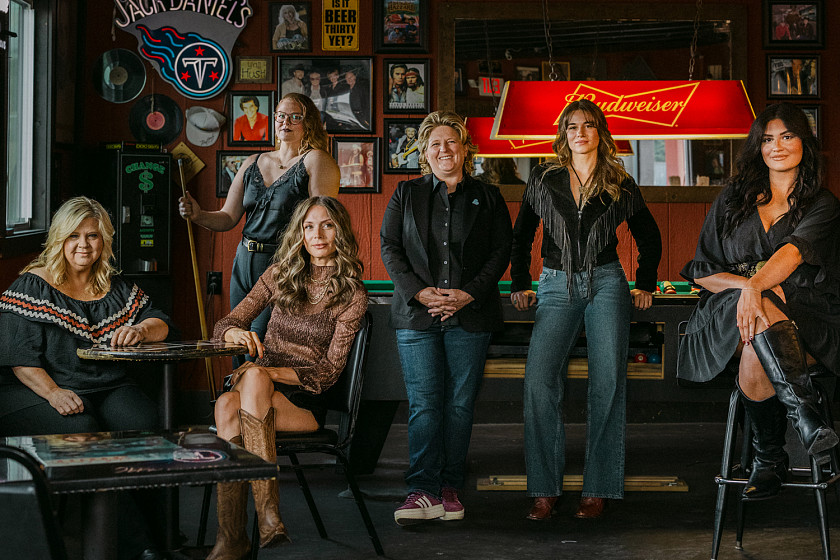
Sister Sadie
Sister Sadie
There was never a master plan.
No label pitch. No brand blueprint. Just a spontaneous jam session at Nashville's Station Inn between a few friends. All women, all seasoned players out to make a little noise on a weeknight. What happened next was alchemy: the room lit up, the crowd roared and by the time the night was over, something had shifted. The landscape of bluegrass, and the women who played it, would never be the same.
That night became the origin story of Sister Sadie: a band born by accident, kept alive by chemistry and fueled by an unshakable bond between women who had spent their lives not just learning the rules, but defying them.
Over the next decade, Sister Sadie would become a powerhouse. A GRAMMY-nominated, IBMA-sweeping, Grand Ole Opry-starring force. But for all the stages they played and accolades they earned, they were still often reduced to a single line: all-female bluegrass band.
It was true, yet reductive. Because Sister Sadie was never about labels. They were about the music. They are about the music. The stories. The fire. And the unrelenting drive to speak their truth through a tradition that hadn't always made room for it.
"We've never been interested in playing a role to fit someone else's idea of what bluegrass should look like," says Deanie Richardson, the band's fiery fiddle player and a two-time IBMA Fiddle Player of the Year. "We've always played from the heart, and from the gut."
Now, with the release of All Will Be Well, Sister Sadie isn't just rewriting the rules. They've burned the whole damn playbook too.
This is the sound of a band that's grown, hurt, healed and evolved. A record born not from the need to prove something, but from the desire to tell the truth, and loudly. On All Will Be Well, you can still hear the fingerprints of bluegrass all over the instrumentation. But what rises above is something bigger: a fearless fusion of country, Americana, gospel and pure emotional storytelling.
"This album is us, no filter," says Gena Britt, founding member and banjo powerhouse. "We didn't try to stay inside any lines. We just wrote and recorded what felt honest."
And what stories they are. On "Prodigal Daughter," written by Dani Flowers, lead vocalist Jaelee Roberts, the 2024 IBMA Female Vocalist of the Year, delivers a performance so raw and haunted, it feels like she's lived every lyric. "Do What You Want" crackles with righteous defiance, a declaration of self-worth wrapped in swagger and stomp.
"This Is Me (You're Not Talking To)" turns heartbreak into a battle cry, while "If I Don't Have You" strips everything back to what really matters: love, desire and the spaces in between.
Then there's "Orphan Train," a stunning reimagining that runs on rails of grief and hope. It's a nod to the past that feels chillingly present. The title track, "All Will Be Well," a Gabe Dixon tune that offers a quiet benediction to anyone who's been through the fire and comes out singing. And "Let the Circle Be Broken" flips the old gospel standard on its head, turning rupture into renewal.
The band even makes room for a little romantic chaos on "Can't Let Go of Your Love" — proof that heartbreak songs still slap hardest when they're wrapped in banjo rolls and airtight harmonies.
This is not a band flexing for the industry. This is six women telling you exactly who they are.
And who they are is formidable.
Gena Britt brings decades of road-tested banjo chops and a vocal tone that anchors the band's harmony-rich sound. Deanie Richardson's fiddle playing bridges ancient soul and modern electricity.
Jaelee Roberts commands attention with a voice that can cut glass or cradle it. Dani Flowers, a gifted songwriter with cuts across country and Americana, adds heart and heat through her lyrics and guitar work. Rainy Miatke brings sharp mandolin picking and a fresh creative spark that fits like a glove. And the newest addition, Katie Blomarz-Kimball, brings an extensive bass knowledge that has become the inimitable driving force behind Sister Sadie.
"We're not trying to be anybody else," says Dani Flowers. "This is the most 'us' we've ever sounded."
That feeling of arrival, of authenticity, pulses through every track on All Will Be Well. It's a record built on scars and joy, strength and surrender. It's not just about surviving the storm, it's about coming out the other side louder.
"It's not about being bluegrass enough," says Jaelee Roberts. "It's about being brave enough to evolve."
That evolution has been hard won. Sister Sadie has spent years fighting for their space in a genre that often asked them to shrink. But instead of shrinking, they rose and continue rising.
Three IBMA Vocal Group of the Year awards. Two GRAMMY nominations. A headline spot at nearly every major roots festival. A seat on the Opry stage. And most importantly, the voice of the next generation of roots music.
Still, All Will Be Well marks a new chapter. A band no longer defined by what they represent but by what they sound like.
"This record is a reminder that you can stay rooted and still grow wild," says Rainy Miatke.
From gut-punch ballads to high-octane instrumental parts, All Will Be Well is the album Sister Sadie was always meant to make. Not for the industry. Not for the silencers. But for the women they've become and the world ready to listen.
Because yes, Sister Sadie is still a bluegrass band. But they're also more.
They are country with claws. Americana with muscle. Harmony-driven and hellbent on telling the truth. And they're not asking for permission anymore.
They're making room. They're taking names.
And they're just getting started.
Schedule
-
Friday, Mar 13
Soundcheck Showcase7:00 PM - 8:15 PMAtrium -
Saturday, Mar 14
Sister Sadie9:45 PM - 11:00 PMSpinnaker Lounge -
Tuesday, Mar 17
Sister Sadie6:00 PM - 7:15 PMAtrium